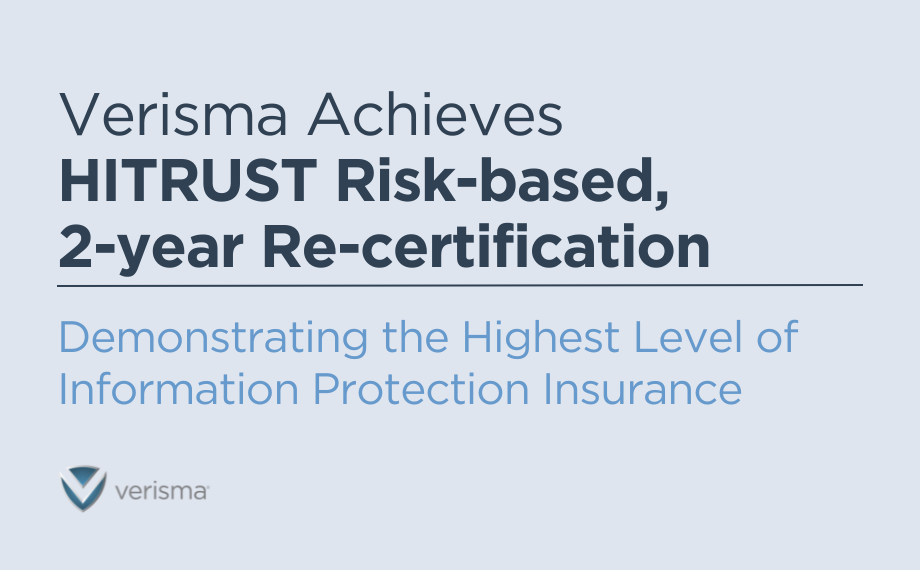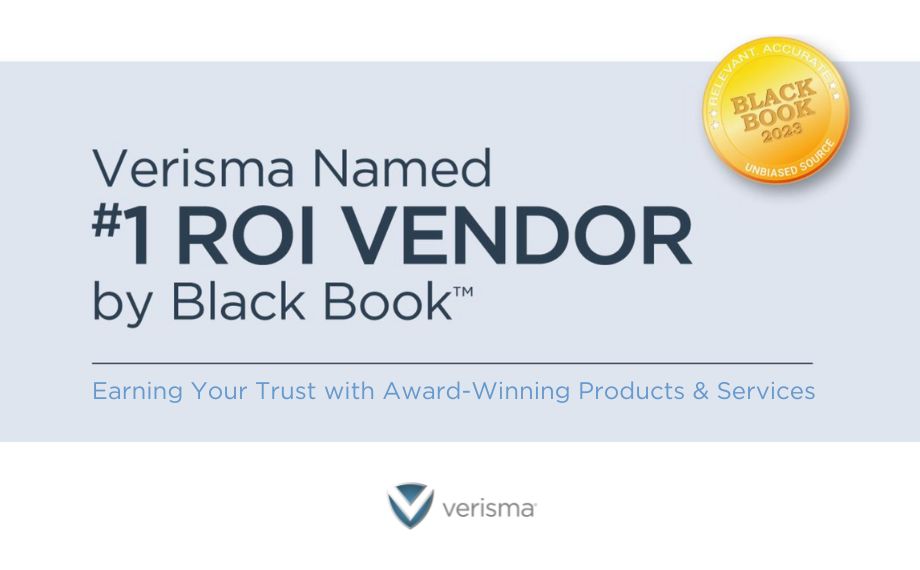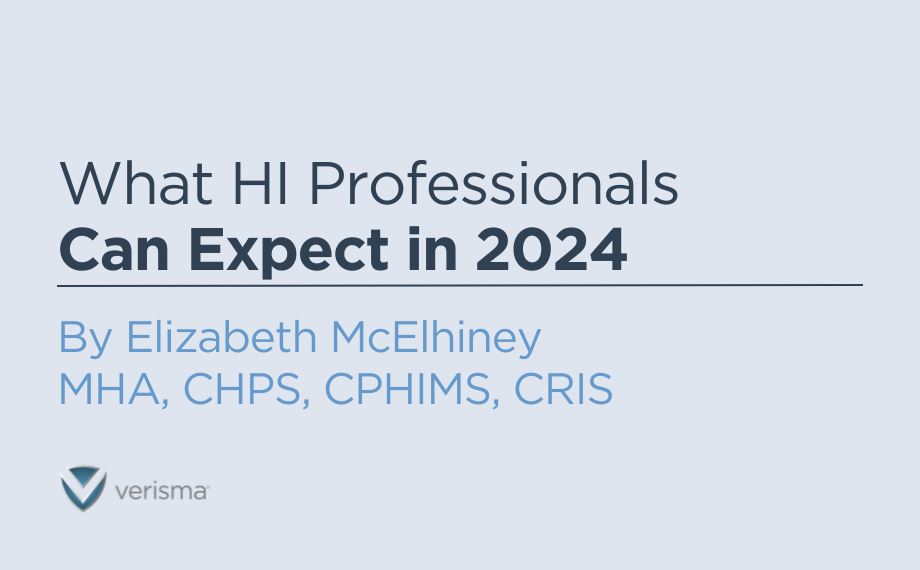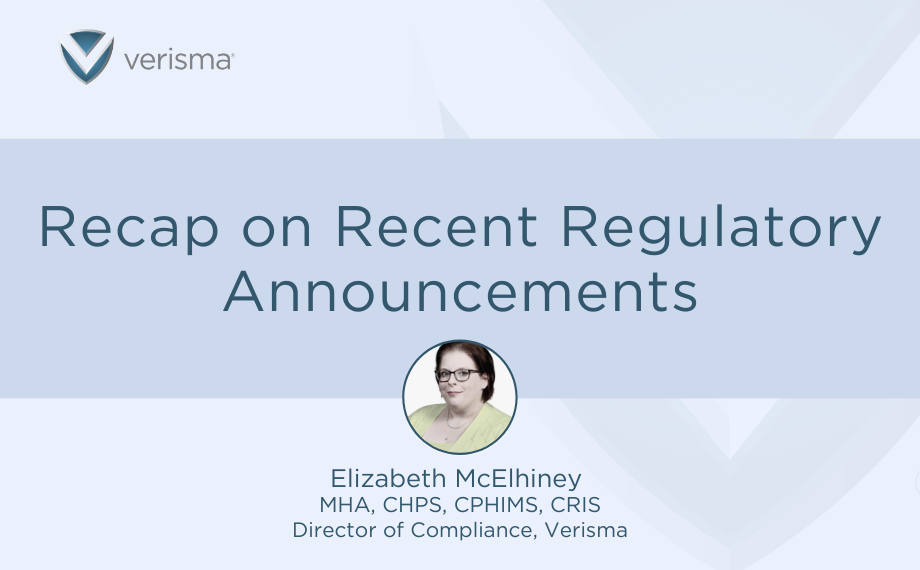


Verisma Rated Top Release of Information and Audit Management Solution
 The survey included 689 physician practices, 1,019 hospital and health system users, and over 100 health plan executives.
Read the full Black Book press release here.
The survey included 689 physician practices, 1,019 hospital and health system users, and over 100 health plan executives.
Read the full Black Book press release here.
Verisma ranked #1 in 11 Black Book categories, including:
- Strategic alignment of goals
- Innovation
- Client relationships and cultural fit
- Trust, accountability, ethics and transparency
- Integration and interfaces
- Scalability, client adaptability and flexible pricing
- Staff expertise, compensation and employee performance
- Brand image and marketing leadership and communications
- Marginal value adds
- Support and customer care
- Technology and process improvement
We are truly honored to be recognized as a top provider in Release of Information. This achievement underscores our dedication to innovation, transparency, and, above all, earning the trust of those we serve. We extend our heartfelt gratitude to our clients who participated in this study and remain steadfast in our mission to exceed their expectations.

What HI Professionals Can Expect in 2024
Director of Compliance and Government Affairs
Verisma
January 2, 2023
Privacy gets (more) complicated
We’ve said it before – the US is overdue for a national conversation on privacy. 2023 only increased the stakes with the increased adoption of AI, stark state-level differences on social policies, and the prevalence of cybersecurity threats. Navigating these conflicts – in the absence of a national privacy framework – will be increasingly time-consuming and high-stakes for privacy and compliance professionals.
Patients will be the primary focus
Healthcare consumerism and patient-centered care have been hot topics in 2023 and will remain so in 2024. One area that hasn’t received as much attention is the emphasis on individual patient factors – for example, what constitutes a burden for some patients when requesting records is not for others. Information blocking exceptions specifically prioritize individual factors in the preventing harm and content/manner exceptions. It will no longer be enough to have a black-and-white procedure manual; instead, organizations may want to consider a “playbook” of factors to be considered.
Expect regulatory activity, especially in early 2024
The last Congress will be one of the least productive in memory – and there weren’t high hopes given the ideological polarization and thin margins in both chambers. Expect to see regulatory agencies attempt to step in through rulemaking. Early 2024 will likely see the most activity – agencies will want to publish or enact any rules prior to 60 days before a potential change in administrations.
and as always …
Executing on fundamentals is key
This one goes across all areas – we can’t stop emphasizing fundamentals while we handle increasing complexities. It’s the little things that get you in the end. Keep on top of cybersecurity by emphasizing employee cyberhygiene, patient privacy and safety by verifying patients with two identifiers, and patient access by improving request processes and adding new delivery options.
Verisma Compliance Resources

Recap on Recent Regulatory Announcements
Director of Compliance and Government Affairs
Verisma
October 30, 2023
Compliance Connect: Virtual Roundtable
White House
The White House announced that President Biden was issuing a new Executive Order (EO) on Safe, Secure, and Trustworthy Artificial Intelligence. The EO contains several overarching themes, which includes New Standards for AI Safety and Security; Protecting Americans’ Privacy; Standing Up for Consumers, Patients, and Students; Promoting Innovation and Competition.
- Promote national cybersecurity by ensuring that creating an advanced cybersecurity program to leverage AI to find/fix vulnerabilities in critical software.
- Promote the responsible use of AI in health care; requires the creation of safety program to intake reports of AI harm/unsafe behaviors as well as remedy these complaints.
- Evaluate how government agencies collect and use commercially available information – including information obtained through data brokers.
- Seeks to prioritize federal support for promoting the development/deployment of privacy-preserving techniques. Additionally, establish guidelines for federal agency use in testing the efficacy of privacy-preserving techniques.
You can find the fact sheet at this website: EO on Safe, Secure, and Trustworthy Artificial Intelligence fact sheet
ONC
The ONC announced this morning that the long awaited NPRM on appropriate provider disincentives for committing information blocking will be published in the Federal Register on Wednesday, November 1st. The previously announced disincentives were intended for health information exchanges (HIEs), health information networks (HINs), and developers of Certified EHR Technology (CEHRT).
The identified disincentives would pertain to certain health care providers that also are Medicare-enrolled providers or suppliers. Consequently, these disincentives are related to qualification as a meaningful EHR user under specific programs.
Some notable disincentives include:
- An eligible hospital or critical access hospital would not be classified as a meaningful EHR user under the MPI program for the associated reporting period. Financial disincentives differ according to the type of hospital.
- Similarly, a health care provider or group would not be classified as a meaningful EHR user under the MIPS program.
- Health care providers who are an ACO, participants in an ACO, or a supplier/provider of an ACO would not be eligible to participate for a minimum of 1 year. Ineligibility may result a provider being ineligible to join an ACO or removal from an ACO.
The Comment Period will be open from November 1st, 2023 to January 2nd, 2024. You can make a comment in a number of different ways; the simplest would be to click the “Submit a Formal Comment” button on the Federal Register page for the proposed rule (link below).
Upon finalization of the proposed rule, OIG would begin enforcing the provider disincentives.
ONC Press Release: HHS Press Release: Appropriate Disincentives for Providers who Engage in Information Blocking
Additional News
Upcoming Events
ONC Tech Forum: Aligning USCDI, FHIR US Core, C-CDA and other Heath IT Standards – November 3, 2023
Information Blocking Disincentives Proposed Rule Information Session – November 15, 2023
Verisma Compliance Resources
Top Reasons to Optimize Payer Audit Management
Herea are some top reasons you should focus on optimizing your payer audit management process:
Enhanced Efficiency and Organization: The integration of all audit-related information and documents into a centralized system streamlines the entire audit process. This eliminates manual tracking, reduces administrative burdens, and safeguards against missing critical deadlines.
Timely Response to Audits: By diligently tracking audits from the moment of request, Release of Information Specialists (ROIS) can promptly respond to audit inquiries, reducing the likelihood of delayed or incomplete responses that may lead to denials. An integrated system also provides valuable data on the status of audits, ensuring that deadlines are met.
Improved Visibility and Transparency: Payer audits involve multiple steps and stakeholders. A comprehensive system offers real-time visibility into the audit status, empowering coding teams, clinical documentation teams, compliance officers, and management to stay informed about audit progress, denials, and appeals.
Identification of Patterns and Trends: With an effective audit management process, organizations can identify patterns and trends in coding audits and denials. Analyzing this data enables a proactive approach to address root causes and prevent future denials, ultimately leading to improved financial outcomes.
Compliance and Regulatory Adherence: Adherence to coding and billing regulations is critical for healthcare organizations. Your audit tracking solution should be built to ensure systematic compliance with these requirements.
Effective Appeals Management: Tracking audits through the denial and appeal process is essential for efficient appeals management. With proper audit management technology, an audit team can identify common reasons for denials and develop targeted strategies to overturn them.
Data-Driven Decision Making: Comprehensive reporting capabilities (beyond spreadsheets) enables an audit team to gather data on audit outcomes, denials, and appeal success rates. Armed with this critical data, financial teams can make informed decisions regarding coding practices, training needs, and resource allocation.
Proactive Risk Mitigation: Vigilant monitoring of audits and denials allows organizations to proactively address potential compliance risks and coding errors. This approach reduces the financial impact of denials and minimizes the risk of audits leading to legal or regulatory issues.
